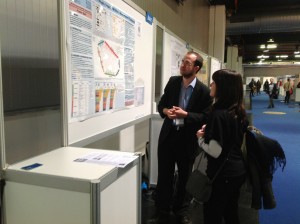Following the success of our own conference last month and the great opportunities we have had to get involved in the EGU over the past couple of years, we are delighted to be involved in a number of sessions at the 2014 General Assembly in Vienna, Austria. Collaborating with other partners and convenors, these sessions will give students and academics the opportunity to profile research that is at the heart of our vision and purpose…
Abstracts for all of these sessions – and many more – can be submitted by the EGU 2014 website, with a deadline of 16th January 2014. Please note that there are also financial bursary packages available (funded and administered by the EGU, not ourselves) for young scientists and scientists from low-middle income countries. The deadline for all bursary applications is 29th November 2013.
EOS12 – Geoscience and International Development
Convened by: Joel Gill (GfGD/King’s College London) and Jennifer Holden (University of Aberdeen)
Geoscience has an important role to play in the fight against global poverty and sustainable international development. For example, understanding groundwater can enable us to bring clean water to communities who previously had to walk many kilometres to collect it. An in-depth knowledge of hazards (such as earthquakes, volcanic eruptions and landslides) can inform and improve disaster risk reduction. The use of local minerals and rock materials can improve soil fertility and reduce erosion. Engineering geology, natural resources, medical and contaminant geology and climate change research all have the potential to support the fight against global poverty and international development.
Good geological knowledge, however, is not sufficient to guarantee the success of international development projects. The effective application of geological skills will necessitate a number of other skills and knowledge sets, such as (i) a thorough understanding of local cultures and customs, (ii) an ability to work in multi-disciplinary teams, (iii) approaches to facilitate communication to multiple stakeholders, and (iv) an understanding of community vulnerability, culture and behavioural traditions.
This session will explore the integration of these factors in order to improve project safety, sustainability and success. We welcome contributions ranging from across the geosciences with a focus on case studies and lessons learnt from undertaking research particularly in (but not limited to) the global south. Possible topics of interest include (i) methods to improve local community participation in research, (ii) effective geoscience communication across cultural boundaries, (iii) successful integration of geoscience into multidisciplinary development work, and (iv) the incorporation of indigenous knowledge.
Convened by: Jane Robb (European Geosciences Union)
Widening participation is a common term used by universities in engaging communities with research and encouraging young people to attend university. However, this session would like to consider widening participation of communities’ involvement, use and impact on geoscience research and dissemination. Education for sustainable development is another common theme within university curricula and is a particularly prevalent issue within geoscience subjects and yet ensuring research is put into practice involves engaging communities in order to ensure validity and relevance of sustainable development research and practice in a modern world. This session welcomes proposals from those who have applied their scientific research in geoscience subjects relevant to sustainable development to communities in an attempt to improve lives of local or international communities.
NH9.8 – Geoethics: Ethical Challenges in Communication, Geoeducation and Management of Natural Hazards
Convened by: Silvia Peppoloni, Susan Kieffer, Eduardo Marone, Yuriy Kostyuchenko, Joel Gill
[This session is organized by the IAPG (International Association for Promoting Geoethics)]
Full session description can be found here. Conveners invite authors to submit abstracts with their views, reflections, suggestions and experiences in an ethical perspective that could be helpful in understanding problems and finding solutions for a successful interaction between scientific community, media, institutions and local populations, with the overall aim of improving the effectiveness of measures to protect people and their assets from natural hazards.
NH9.4 – Natural Hazards Education, Communications and Science-Policy-Practice Interface
Convened by Bruce Malamud, Joel Gill, Faith Taylor and Monika Mihir
[This session is organised by researchers from Department of Geography, King’s College London]
This session addresses how we communicate and educate students, the public, policy makers, and practitioners about natural hazards. Although we welcome all contributions in this topic, we are particularly interested in: (i) The communication (by scientists, engineers, the press, civil protection, government agencies, and a multitude other agencies) of natural hazards risk and uncertainty to the general public and other government officials; (ii) Approaches that address barriers and bridges in the science-policy-practice interface that hinder and support application of hazard-related knowledge; (iii) The teaching of natural hazards to university and lower-level students, using innovative techniques to promote understanding. We also are specifically interested in distance education courses on themes related to hazard and risk assessment, and disaster risk management, and in programmes for training in developing countries. We therefore solicit abstracts, particularly dynamic posters, on all aspects of how we communicate and educate the better understanding of natural hazards. The ability to have graphic screens at poster sessions is available (if pre-ordered through EGU), as is a location to put hands-on demonstrations or other material. We are initially planning poster (or a PICO) session, combined with opportunity for those who want to orally present to the rest of the group, and ample time for discussion.
——–
On Wednesday we will be highlighting some other sessions at EGU 2014 that may interest our readers… but do take the time to explore the website and full list of proposed sessions yourself… and remember – young scientists and those from low/middle income countries can apply for financial support if abstracts are submitted BY 29th NOVEMBER 2013


Pingback: EGU General Assembly 2014 – Some Session Highlights… | Geology for Global Development